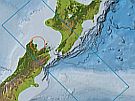Watch the introductory video for Sustainable Seas 2.
Introduction to Sustainable Seas 2019 from LEARNZ on Vimeo.
Tuesday 5 March
1. Rebecca and Clara's Research
Meet Rebecca and Clara from the University of Otago. Find out what they are studying and how they take samples in the marine environment.
2. Marine Ecosystems
Talk to Clara about all the elements that make up an ecosystem and what is affecting the health of the Tasman Bay marine ecosystem.
3. Ecosystem Based Management - a Balancing Act
Discover more about the Sustainable Seas National Science Challenge and how it is trying to manage the use of marine areas so they remain healthy for generations to come.
4. Snapper Dissection
Come into the NIWA research lab and help dissect a snapper. See what this fish can tell us about the environment in which it lives.
5. Mussel Dissection
Watch Clara dissect a bivalve. See what this mussel has been eating and find out what scientists can learn from analysing tissue samples.
Wednesday 6 March
1. Kaitiakitanga o te Moana
Meet Regan Fairlie from Manaaki Te Awanui and hear about what Kaitiakitanga means in terms of marine ecosystems and how we can preserve the mauri of estuaries.
2. Stressors and Tipping Points
Talk to PhD student Sam Thomas about the stressors that are impacting on our estuaries and what happens when an ecosystem can no longer cope with these.
3. Cockle/Tuangi Habitat
Work with students from Hampden Street School on a cockle tuangi monitoring activity and see which habitat cockles tuangi prefer.
4. Estuary (and Ecosystem) Services
Discover the important services that estuaries and other ecosystems provide and look at the role of filter feeding shellfish.
Thursday 7 March
1. The Motion of the Ocean
Talk to Ross Vennell, an oceanographer, to find out what causes ocean currents and why these are important.
2. Plastic and the Ocean
Join Heni and Ross from the Cawthron Institute in Nelson and discover why plastic can cause such a problem in marine environments.
3. Virtual Plastic Tracker
Take a look at the plastic tracking app to find out where plastic can end up when it is dropped into the ocean. See the information this can give scientists and discover how this information can be used to help manage marine areas.
4. Action Points for the Plastic Problem
Take time to think about how you can use less plastic and help reduce the amount of plastics entering our ocean.
For teachers
For help and more information about LEARNZ videos, go to Help with Videos in the LEARNZ Support section.
Video question sheet - Word (31k) | PDF (217k) | Google doc to use for each video (based on SOLO Taxonomy).




